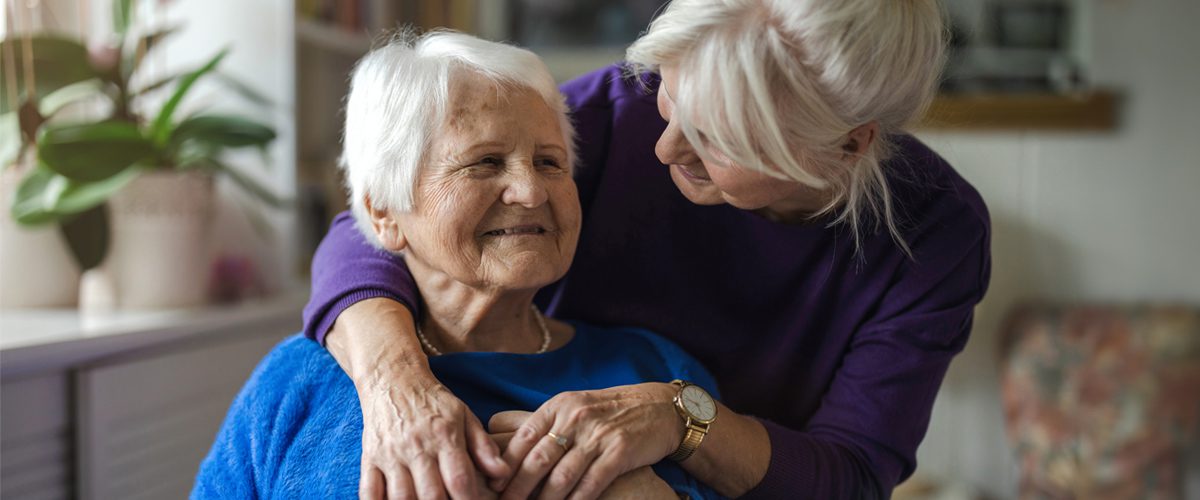How to Support a Loved One With Alzheimer’s — and the Best Ways to Connect
A neurologist offers advice on how to best communicate with and care for someone who has Alzheimer’s disease.

Alzheimer’s disease, a brain disorder that impacts memory, thinking, and behavior, affects more than 6 million adults in the U.S., according to the Alzheimer’s Association. It is the most common form of dementia, which is an umbrella term for symptoms associated with cognitive decline. When a loved one gets diagnosed with dementia or Alzheimer’s, it can be challenging to know how best to sustain a strong relationship with them. But there are strategies that can help both caregivers and people with Alzheimer’s feel more connected with each other.
“It’s easy for family members and friends to get frustrated at the situation,” says Dr. James M. Noble, a neurologist at NewYork-Presbyterian/Columbia University Irving Medical Center. “But try your best to direct the frustration at the disease, not the person.”
Dr. Noble shared with Health Matters tips for communicating and handling stressful situations, and some resources available to caregivers.

Dr. James M. Noble
Practice Patience
While it’s frustrating to see a loved one struggle with memory or everyday functioning, remember that those symptoms aren’t something within their control. “It’s a natural response to become upset and tired at times, but try to remain calm,” advises Dr. Noble. “Avoid phrases like, ‘Come on. I just told you that.’ It won’t help the person remember. Be patient, be supportive, and look for answers and provide them when you have them.”
Treat Your Loved One Like an Adult
Taking care of a loved one with Alzheimer’s can be physically and emotionally demanding, and when daily functioning becomes difficult, Dr. Noble will sometimes hear caregivers say, “I feel like I’m taking care of a child,” he says. “I try to steer away from that language because we don’t want to lose sight of the fact of who it is that they’re taking care of. I always suggest avoiding using ‘baby talk,’ or talking to that person as if they were a child. You can use plain language, but always talk to them like an adult.”
Redirect When Necessary
People with memory issues may forget certain major life events, including upsetting ones, such as the death of a spouse. If they ask to see a person who has died, for example, try redirecting the question to avoid more confusion. “Instead of reminding them of an upsetting event and having them relive that grief, it’s OK to change the subject or change the environment, which could be more soothing,” says Dr. Noble. “I would never advocate overt lying, but consider the circumstances and remember to be caring and human.”
Don’t Escalate
If you’re in a situation in which the person with Alzheimer’s is upset and confused, you can make strategic choices to avoid escalating a situation. Dr. Noble gives an example of a person who becomes paranoid that someone has stolen from the safe deposit box and wants to look for their valuables. “Even if you take them down to the bank to check, they still might think you’re trying to fool them, or they might forget as soon as you leave the bank, starting the cycle all over again,” says Dr. Noble, highlighting how it becomes a frustrating experience for both the person with memory issues and the caregiver. “Instead, try to creatively steer the conversation away. When the person is experiencing delusion, which is categorized as a fixed false belief, we want to minimize agitation and suffering. Redirect and reorient support, find a soothing environment, and be mindful that even if you demonstrate information, it may not always help.”
Actively Converse
Many people may feel like there’s no point in having a conversation with someone who will forget what you’ve said, or who have trouble relating. But Dr. Noble says it’s worth trying. “I think there’s a value to going through it as an exercise, as kind of a responsibility of sharing this information with somebody at least once, expecting they might remember more than you realize,” he says. “It’s never too late to try to sustain or form relationships. Even in those later stages, if somebody may not be able to respond back to you, you should always talk to them as though they can hear and understand you. Even if they can’t express themselves, they can still appreciate and be receptive of care.”
Find Other Ways to Connect
For a person with Alzheimer’s, exercising, eating a healthy diet, and staying socially engaged are all good habits. Even though studies have shown that those lifestyle factors won’t impact the outcomes for those with Alzheimer’s or dementia, there’s a benefit for families, says Dr. Noble. “It is not just about the person with dementia, but the whole family unit,” he says. “It’s important to get out and do something, enjoy each other, and get some normalcy into one’s day-to-day life. It can be very basic things, like a walk in the park or a meal together, but really it’s about togetherness.”
Dr. Noble co-founded a nonprofit called Arts & Minds that offers patients with dementia opportunities to go to museums and do art classes with their care partners. The experience allows families to communicate with each other in different ways and carry those experiences with them. “The idea is that if caregivers had a positive experience at the museum that day, maybe they can apply something they saw that day to another circumstance at home, or be better able to cope with some of the more challenging moments,” says Dr. Noble.
Build on Trust
It can be understandably very upsetting to cope with the fact that a loved one has Alzheimer’s, especially if they are in the later stages of the disease and might not recognize those close to them. But even when somebody cannot name a person correctly, there’s often a capacity for keeping or developing trust. “It’s almost an emotional memory assigned to some context or some person, even if they don’t remember their name,” says Dr. Noble. “Even in advanced stages, there’s always appreciation that somebody’s caring for them.”
Utilize Caregiver Resources
There are many informational resources online through the National Institutes of Health, as well as through caregiver advocacy organizations such as the National Institute on Aging (NIA). Nearly all of these organizations offer both support groups and hotlines for caregivers to call and speak with a professional — for example, if there’s an issue in the middle of the night that doesn’t require urgent medical attention, but still requires some assistance.
“Every caregiver journey is unique. And everybody has to find their own path to figuring out what works for them,” says Dr. Noble. “But utilize resources to make the journey as smooth as possible.”
James Noble, M.D., M.S., is a neurologist with NewYork-Presbyterian/Columbia University Irving Medical Center and an associate professor of neurology at Columbia University Vagelos College of Physicians and Surgeons who specializes in dementia and better understanding its risk factors. Dr. Noble directs and supports several longitudinal NIH-supported research initiatives related to Columbia’s Alzheimer’s Disease Research Center that aim to identify novel modifiable risk factors for cognitive aging and improve public health literacy. He is the author of Navigating Life with Dementia, a handbook for dementia caregivers. Dr. Noble also co-founded Arts & Minds, a nonprofit organization promoting well-being for dementia patients and their caregivers via art-centered, museum-based experiences.
Additional Resources
Find an expert in Alzheimer’s disease at NewYork-Presbyterian.
